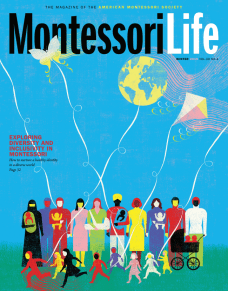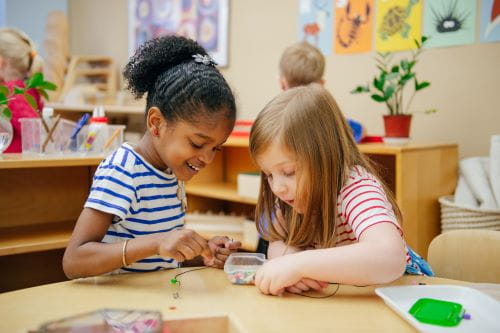
This article was featured in our 2018 Fall edition of Montessori Life magazine. Read full issues online (AMS members only).
AMS members also receive a print subscription to Montessori Life magazine. Become a member today to receive your own subscription plus access to the complete digital archives.
So, let’s get real. You’ve loved the first two years of the Montessori Early Childhood program for your young child. Now, as you look ahead, you are facing a decision about the third, and final, year of the EC program—the capstone year, sometimes known as kindergarten.
What are your options? Well, your friends’ children attend a private school, and while it’s not Montessori, it does have the attraction of going all the way through high school. Or there is that non-Montessori public school in your neighborhood that your child could walk to, with the banner outside proclaiming its status as a 5-star school. Or the charter school that needs you to enroll now or your child won’t get a first-grade spot the year after next.
While tuition-free school is compelling, and maybe you even moved to your neighborhood because of their touted great schools, or you believe that charter when they tell you it’s now or never, please also consider staying with Montessori through the capstone year.
Two hallmarks of Montessori education are the mixed-age grouping and the 3-year cycle. Pulling your child out before he has completed the full 3-year cycle will deprive him of the following benefits.
- In her first year at Montessori, all those “big kids” seemed so, well, big. They could do amazing things. Your child was in awe of them—in fact, she may have mentioned an older child or children in the classroom, a 5- or 6-year-old she idolized. Just as in real life, children learn from their elders. Now, your child will get to be one of those “big kids.” The capstone year is also known as the leadership or consolidation year, in which your third-year child takes great pride in solidifying all she has learned over the past 2 years and assumes greater responsibilities in the classroom. This happens naturally, because it was modeled for her when she was younger. She will expect to be (and will be looking forward to being) in this new role of “big kid” in the classroom.
- Your child will have the same teacher for 3 years. The teacher truly knows your child. And you get to know the teacher over the longer cycle; the relationship between school and family builds on trust and mutual respect.
- The 3-year cycle allows your child to acquire skills and academic knowledge at his own pace. Perhaps reading came to him more quickly than math, or fine-motor skills seemed second nature while gross-motor skills took longer. The Montessori Early Childhood environment has no set timetable for mastery but instead offers him 3 full years to acquire capability. Not all 5½-year-olds are expected to be fluent readers or understand multiplication. Would you be comfortable being held accountable for a skill simply because a statistical model or a test stated you “should know this by now”?
- The 5- to 6-year-old generally has more command over her body and is able to work longer, with more concentration, on academic subjects. To her delight, a work she may have struggled with last year is now manageable. She says to herself, Well, that was fun— what else can I now do that I couldn’t do last year?
- The social-emotional world of the 5- to 6-year- old evolves into more collaboration with peers: solving problems, working out conflicts, and coming to understand the other person. This happens naturally in Montessori because students have been together for all this time and know each other well—and they know this classroom, this environment.
- Because the 5- to 6-year-old is more confident in himself, he watches out for the younger children. Acts of benevolence toward the younger child not only endear that younger child to his older classmate, they allow that older child to open his heart to the needs of others. Most of the time, this all happens without the teacher saying a word. It’s inherent in the Montessori culture.
Over the years, we Montessorians have observed children who, having completed the full Early Childhood cycle, matriculate confidently into first grade in a non-Montessori program or into Lower Elementary in a Montessori school. There is research to back this up as well; see Suggested Reading below.
Consider this an appeal to offer the gift of time to your child.
Suggested Reading
Lillard, A. & Else-Quest, N. (2006, September 29). Evaluating Montessori education. Science 313(5795), 1893–1894. Retrieved from science.sciencemag.org/content/313/5795/1893.doi: 10.1126/science.1132362.
Marshall, C. (2017, October 27). Montessori education: A review of the evidence base. NPJ Science of Learning 2(11). Retrieved from nature.com/articles/s41539-017-0012-7. doi: 10.1038/s41539- 017-0012-7.
About the Author
Donohue Shortridge is a Montessori school consultant based in Littleton, CO. Visit her website at pdonohueshortridge.com.


